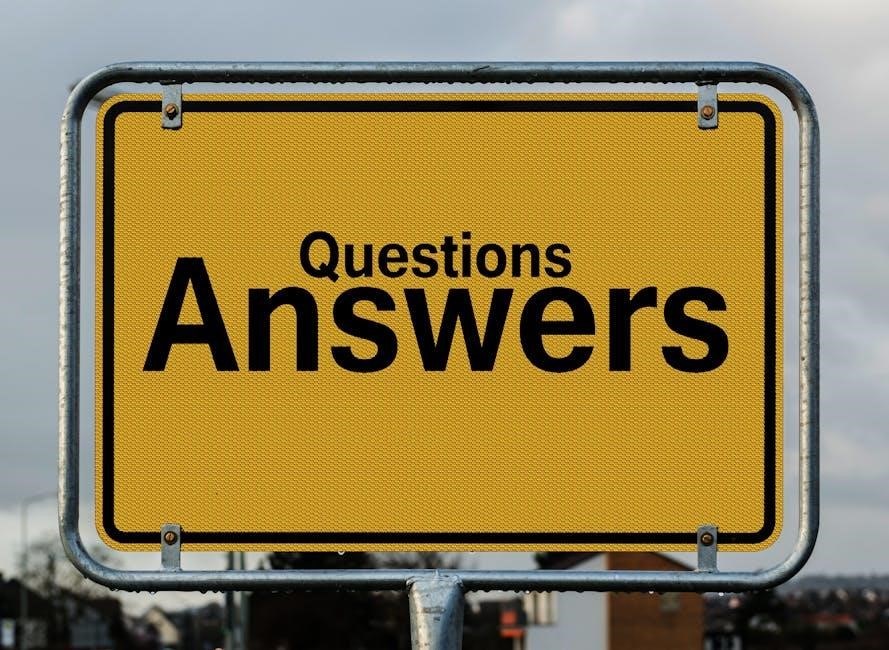Smart Serve Certification is a mandatory training program for alcohol service professionals in Ontario, ensuring responsible alcohol service and legal compliance.
1.1 Overview of the Smart Serve Program
The Smart Serve program is a mandatory certification for individuals serving alcohol in Ontario, designed to promote responsible alcohol service. It covers essential topics like the Traffic Light System, standard drink sizes, and signs of intoxication. The program ensures servers understand their legal responsibilities and can identify and manage risks associated with alcohol service. Participants learn practical skills to refuse service to intoxicated patrons and handle challenging situations effectively. The certification is valid for five years and is recognized province-wide. By completing the program, individuals demonstrate their commitment to creating a safe and responsible drinking environment, adhering to Ontario’s alcohol service laws. This certification is crucial for career advancement in the hospitality industry.
1.2 Importance of Smart Serve Certification in Ontario
Smart Serve Certification is a legal requirement for all individuals involved in the sale or service of alcohol in Ontario. It ensures servers understand their responsibilities and can identify risks associated with alcohol service. The certification helps prevent underage drinking and intoxication, reducing liability for employers and improving customer safety. By completing the program, servers gain the knowledge to serve alcohol responsibly, minimizing legal and health risks. This certification is essential for maintaining a safe drinking environment and adhering to Ontario’s strict alcohol laws. It also enhances career opportunities in the hospitality industry, as it is widely recognized and respected by employers province-wide.

Smart Serve Exam Format
The Smart Serve exam consists of 35 multiple-choice questions, focusing on responsible alcohol service, legal aspects, and practical scenarios. The test must be completed within 45 minutes.
2.1 Number of Questions and Time Limit
The Smart Serve exam includes 35 multiple-choice questions, designed to assess knowledge of responsible alcohol service and legal requirements. Candidates have 45 minutes to complete the test. The time limit ensures a focused approach, with approximately 1.29 minutes per question on average. Proper time management is crucial to answer all questions effectively. The exam is typically administered online, and the format allows candidates to navigate through questions freely. Practicing with sample tests is highly recommended to build familiarity with the pacing and content. Managing time wisely during the exam is essential to ensure all questions are addressed thoroughly.
2.2 Types of Questions (Multiple Choice)
The Smart Serve exam features multiple-choice questions, each designed to test knowledge of responsible alcohol service. Questions cover topics such as the Traffic Light System, standard drink sizes, signs of intoxication, and legal aspects of alcohol service. Each question presents four possible answers, with only one correct option. The format requires candidates to apply theoretical knowledge to real-world scenarios, ensuring practical understanding. The questions are straightforward but may include nuanced details to assess comprehension thoroughly. Familiarizing oneself with the question style through practice tests is highly recommended to build confidence and accuracy during the actual exam.
2.3 Passing Requirements
To pass the Smart Serve exam, candidates must achieve a score of at least 80%. The exam consists of 35 multiple-choice questions, and candidates must answer at least 28 correctly. The questions cover essential topics such as the Traffic Light System, standard drink sizes, signs of intoxication, and legal aspects of alcohol service. The time limit for the exam is 45 minutes, allowing candidates sufficient time to review and answer all questions. Scoring is based solely on correct answers, with no penalties for incorrect or unanswered questions. Proper preparation, including practice tests, is crucial to ensure success and meet the certification requirements.

Key Concepts Covered in the Exam
The exam covers essential concepts such as the Traffic Light System, standard drink sizes, blood alcohol concentration (BAC), signs of intoxication, and the legal drinking age in Ontario.
3.1 The Traffic Light System
The Traffic Light System is a tool used to assess a customer’s sobriety level. It categorizes patrons into three groups: Green (sober), Yellow (moderately intoxicated), and Red (intoxicated). This system helps servers determine when to refuse service, ensuring compliance with legal requirements and promoting responsible alcohol service. Servers are trained to observe behavior, speech, and physical signs to make accurate assessments. Early identification of intoxicated patrons prevents potential incidents and legal consequences. The system emphasizes starting assessments as soon as customers enter the establishment to monitor their condition throughout their visit. This proactive approach is crucial for maintaining a safe environment and adhering to Ontario’s alcohol service regulations.
3.2 Standard Drink Sizes and Blood Alcohol Concentration (BAC)
Standard drink sizes help servers understand alcohol consumption levels. A standard drink is 12 oz of beer (5% alcohol), 5 oz of wine (12% alcohol), or 1;5 oz of spirits (40% alcohol). Blood Alcohol Concentration (BAC) measures alcohol in the bloodstream. Each standard drink raises BAC by about 0.03% for a 150-pound person. Servers must recognize how standard drinks affect BAC to assess intoxication. Legal BAC limits in Ontario for driving are 0.08%. Understanding standard drink sizes and BAC helps servers monitor patrons’ alcohol intake, ensuring responsible service and preventing illegal BAC levels. This knowledge is critical for maintaining customer safety and legal compliance in licensed establishments.
3.3 Signs of Intoxication
Recognizing signs of intoxication is crucial for responsible alcohol service. Common indicators include slurred speech, difficulty walking, staggering, or loss of balance. Patrons may appear disoriented, exhibit mood swings, or show poor judgment. Other signs include glassy or bloodshot eyes, loud or inappropriate behavior, and slowed reactions. Servers should monitor these signs to assess a patron’s sobriety and prevent over-serving. Understanding these indicators helps ensure compliance with legal standards and promotes a safe environment. Early recognition allows staff to intervene appropriately, such as refusing further service or offering assistance. These observations are key to maintaining customer safety and adhering to Smart Serve guidelines.
3.4 Legal Drinking Age in Ontario
In Ontario, the legal drinking age is 18 years old, though some establishments may enforce a minimum age of 19. It is essential for servers to verify patrons’ ages using valid government-issued ID to ensure compliance with provincial laws. Serving alcohol to underage individuals is illegal and can result in severe penalties for both the establishment and the server. Understanding and adhering to the legal drinking age is a critical component of responsible alcohol service. Servers must remain vigilant in checking identification to prevent underage drinking and maintain a safe and lawful environment. This practice aligns with Smart Serve certification requirements and promotes public safety.

Legal Aspects of Serving Alcohol
The legal aspects of serving alcohol in Ontario involve licensing, age restrictions, and penalties for non-compliance. The AGCO oversees regulations, ensuring responsible service and legal adherence to prevent violations.
4.1 Licensing Authorities (AGCO)
The Alcohol and Gaming Commission of Ontario (AGCO) is the primary licensing authority for alcohol service. It ensures compliance with provincial regulations, issuing permits and enforcing standards. The AGCO regulates the sale, service, and consumption of alcohol in Ontario, maintaining public safety and legal standards. They also handle infractions, with penalties for violations such as serving underage or intoxicated patrons. Understanding AGCO’s role is crucial for certification, as exam questions often cover licensing procedures and legal responsibilities. Effective preparation involves studying AGCO regulations to navigate the complexities of alcohol service laws confidently.
4.2 Legal Consequences of Serving Underage or Intoxicated Patrons
Serving alcohol to underage or intoxicated individuals carries severe legal repercussions. Establishments risk penalties, including fines and license suspension or revocation. Staff may face personal liability, with potential legal action against servers and managers. Violations can lead to increased insurance costs and reputational damage. It is crucial to adhere to responsible service practices, such as verifying ID and monitoring patron behavior, to avoid these consequences. Exam questions frequently address these scenarios, emphasizing the importance of compliance with provincial laws and regulations to ensure public safety and legal accountability in alcohol service environments.
4.3 Prohibited Activities in Licensed Establishments
Licensed establishments must avoid activities that breach alcohol service regulations. Prohibited actions include serving alcohol to minors or intoxicated patrons, permiting disorderly conduct, and allowing illegal substances on premises. Establishments cannot serve alcohol beyond authorized hours or sell to unverified patrons. Additionally, promoting excessive drinking through irresponsible promotions is prohibited. These prohibitions are enforced by licensing authorities to maintain public safety and legal compliance. Exam questions often test knowledge of these restrictions, emphasizing their importance in maintaining a safe and lawful environment for patrons and staff alike, while upholding the integrity of the establishment’s license and operational standards.
4.4 Penalties for Violations
Violations of alcohol service regulations in Ontario result in severe penalties. Licensed establishments face fines, license suspensions, or even revocation for non-compliance. Serving alcohol to minors or intoxicated patrons can lead to significant fines, ranging from $500 to $5,000 for individuals and up to $25,000 for businesses. Repeat offenses may result in license suspension or permanent revocation. Additionally, legal consequences for staff and management may include personal liability and criminal charges. These penalties aim to ensure adherence to responsible alcohol service practices and maintain public safety. Understanding these consequences is crucial for exam preparation, as questions often focus on legal repercussions to emphasize compliance.
Responsible Serving Practices
Responsible serving practices involve assessing customers’ sobriety, refusing service to intoxicated patrons, handling emergencies, and managing conflicts to ensure a safe and lawful alcohol service environment.
5.1 Assessing Customers’ Sobriety
Assessing customers’ sobriety is a critical skill for servers. It involves observing signs of intoxication, such as slurred speech, unsteady movements, or aggressive behavior. Servers should monitor how much alcohol a customer has consumed and watch for changes in behavior that may indicate impaired judgment. Using tools like the Traffic Light System can help identify at-risk patrons early. It’s important to approach these situations discreetly and professionally to avoid embarrassing the customer. If a patron appears intoxicated, service should be refused, and alternative solutions, like arranging transportation, should be offered. Regular training and practice are essential to refine these assessment skills effectively.
5.2 Refusing Service to Intoxicated Patrons
Refusing service to intoxicated patrons is a legal and ethical responsibility. Servers must remain confident and professional when denying alcohol to someone who appears impaired. It’s important to use clear, firm language and avoid arguments. Phrases like, “I’m sorry, but I can’t serve you anymore,” are effective. If the patron becomes difficult, stay calm and offer alternatives, such as water or a snack. Never hesitate to involve management or security if the situation escalates. Refusing service protects both the patron and the establishment from potential harm or legal consequences. Proper training ensures servers handle these situations respectfully and effectively.
5.3 Handling Emergency Situations
Handling emergency situations requires quick thinking and proper training. Servers should remain calm and assess the situation to determine the best course of action. If a patron is injured or unwell, call 911 immediately and provide first aid if trained. In cases of severe intoxication, ensure the patron’s safety and seek medical help if necessary. Documenting incidents is crucial for legal protection. Always follow establishment protocols and involve management or security when needed. Proper training ensures servers can respond effectively, minimizing risks and protecting both patrons and the establishment. Stay prepared to handle unexpected situations professionally and responsibly.
5.4 Managing Conflicts and Difficult Situations
Managing conflicts and difficult situations is a crucial skill for servers. Stay calm, listen actively, and avoid taking things personally. Use “I” statements to de-escalate tensions, such as “I understand you’re upset, but I can’t serve you more alcohol.” Offer solutions like water or food instead of alcohol. If the situation escalates, involve management or security promptly. Never argue with patrons, as it can worsen the situation. Documenting incidents helps prevent future issues. Proper training ensures servers can handle conflicts professionally, maintaining a safe and respectful environment for everyone. Effective communication and staying composed are key to resolving difficult situations smoothly and responsibly.
Exam Preparation Tips
Use practice tests to familiarize yourself with the exam format and content. Study key concepts like the traffic light system and standard drink sizes. Allocate time wisely during preparation to ensure thorough coverage of all topics. Review legal aspects and responsible serving practices regularly. Utilize online resources and study guides to reinforce learning. Taking timed practice exams helps improve time management and reduces exam-day anxiety. Focus on understanding scenarios and applying knowledge effectively. Stay calm and confident during the exam to achieve success.
6.1 Effective Study Strategies
Effective study strategies are essential for success in the Smart Serve exam. Start by understanding the exam format and content through practice tests. Focus on key concepts like the traffic light system, standard drink sizes, and signs of intoxication. Allocate dedicated time for each topic, ensuring thorough coverage. Use active learning techniques, such as creating flashcards or self-quizzing, to reinforce memory. Prioritize understanding scenarios and applying knowledge rather than rote memorization. Regularly review legal aspects, such as licensing authorities and prohibited activities, to build confidence. Incorporate short breaks into study sessions to maintain focus. By combining structured study plans with consistent practice, you can master the material and perform well on the exam. Stay organized and confident to achieve your goal.
6.2 Using Practice Tests for Preparation
Using practice tests is a highly effective way to prepare for the Smart Serve exam. These tests simulate real exam conditions, helping you familiarize yourself with the format, timing, and types of questions. By attempting practice tests, you can identify areas where you need improvement and focus your study efforts accordingly. Regularly reviewing practice test questions and their explanations enhances your understanding of key concepts, such as the traffic light system and legal aspects of alcohol service. Practice tests also help reduce exam anxiety by building confidence and improving time management skills. Consistently using these resources ensures you are well-prepared to achieve a high score and successfully complete the certification. Regular review of practice tests is essential for retaining knowledge and applying it effectively during the actual exam.
6.3 Understanding the Exam Format
Understanding the Smart Serve exam format is crucial for successful preparation. The exam consists of 35 multiple-choice questions, each designed to assess your knowledge of responsible alcohol service. You have 45 minutes to complete the test, requiring effective time management. Familiarizing yourself with the question structure and content ensures you can navigate the exam confidently. The questions cover key areas such as the traffic light system, standard drink sizes, and legal aspects of serving alcohol. Knowing the exam format helps you prioritize study topics and practice under timed conditions, enhancing your readiness for the actual test. This knowledge reduces anxiety and allows you to focus on demonstrating your understanding of the material effectively during the exam. Preparation is key to achieving a passing score and obtaining your certification. By understanding the exam structure, you can approach it systematically and efficiently, ensuring all questions are answered within the allotted time. This strategic approach is essential for success in the Smart Serve certification exam.
6.4 Time Management During the Exam
Effective time management is essential for success in the Smart Serve exam. With 35 questions and a 45-minute time limit, allocate approximately 1 minute per question. This allows time to read each question carefully, consider the options, and select the correct answer. Avoid spending too long on a single question, as this can impact your ability to complete the exam. If unsure, mark the question and return to it later. Practice with timed tests to build speed and accuracy. Proper time management reduces anxiety and ensures you can confidently answer all questions within the allotted time, leading to a successful exam experience.

Benefits of Smart Serve Certification
Smart Serve Certification enhances career opportunities, improves knowledge of alcohol laws, boosts customer service skills, and promotes professional growth in the hospitality industry.
7.1 Career Advancement in the Hospitality Industry
Obtaining Smart Serve certification significantly enhances career prospects in the hospitality sector. Employers prioritize certified individuals, as it demonstrates compliance with provincial regulations and a commitment to responsible service. This certification is often a prerequisite for roles such as bartenders, servers, and bar managers. By completing the program, professionals showcase their ability to serve alcohol legally and safely, reducing liability risks for employers. Additionally, certification can lead to higher-paying positions and greater job security. It also signals to employers a dedication to professional development and ethical practices, making certified individuals more competitive in the job market.
7.2 Enhanced Knowledge of Alcohol Service Laws
Smart Serve certification provides a comprehensive understanding of alcohol service laws, ensuring compliance with provincial regulations. The program covers critical legal aspects, such as the licensing process, underage serving consequences, and prohibited activities in licensed establishments. By mastering these concepts, individuals can navigate the legal landscape confidently, reducing the risk of violations. The certification emphasizes the role of the Alcohol and Gaming Commission of Ontario (AGCO) in granting licenses and enforcing standards. This knowledge is essential for maintaining a safe and legal environment, protecting both patrons and establishments from potential legal repercussions. Understanding these laws also empowers professionals to make informed decisions during service.
7.3 Improved Customer Service Skills
Smart Serve certification enhances customer service skills by teaching professionals how to interact effectively with patrons, even in challenging situations. The training emphasizes assessing sobriety, refusing service to intoxicated individuals, and managing conflicts respectfully. These skills improve patron satisfaction and loyalty while maintaining a positive establishment reputation. By understanding legal and ethical responsibilities, service staff can provide a safe and enjoyable environment. Effective communication and conflict resolution techniques are central to the program, ensuring professionals handle difficult scenarios confidently. This expertise not only boosts customer satisfaction but also reduces potential issues, creating a more pleasant experience for both staff and patrons.
7.4 Professional Growth and Development
Smart Serve certification fosters professional growth by equipping individuals with advanced knowledge and skills in responsible alcohol service. It enhances career opportunities in the hospitality industry while building a strong foundation for long-term success. The training promotes a deeper understanding of legal and ethical standards, enabling professionals to navigate complex situations confidently. By mastering the principles of responsible service, individuals can advance in their roles and take on leadership positions. Additionally, the certification is recognized across Ontario, making it a valuable asset for those seeking to expand their career prospects. Continuous learning and skill refinement through Smart Serve ensure ongoing professional development and adaptability in a dynamic industry.
Completing the Smart Serve exam ensures certification, valid for five years, essential for a career in Ontario’s hospitality industry. It enhances knowledge and responsible service skills, promoting professionalism and compliance with alcohol laws. Continuous learning and adaptation to industry changes are crucial for long-term success. Final tip: stay informed and updated to maintain certification and excel in your role.
8.1 Final Tips for Success
To excel in the Smart Serve exam, utilize practice tests to familiarize yourself with the format and content. Focus on understanding key concepts like the traffic light system and signs of intoxication. Allocate time wisely during the exam to ensure all questions are answered. Stay calm and confident, as this will enhance your ability to think clearly. Reviewing answers, if time permits, can help catch errors. Lastly, always adhere to responsible serving practices, as they form the core of the certification. By following these tips, you’ll be well-prepared to succeed and contribute effectively to a safe and professional alcohol service environment.
8.2 The Importance of Continuous Learning
Continuous learning is crucial for maintaining Smart Serve certification and staying updated on alcohol service laws. The hospitality industry evolves, and so do regulations, making ongoing education essential. Regularly reviewing practice tests and updated materials ensures familiarity with new guidelines. Refreshing your knowledge on topics like BAC levels and signs of intoxication helps maintain competence. Continuous learning fosters improved customer service skills and enhances your ability to handle challenging situations responsibly. By staying informed, you contribute to a safer environment and uphold professional standards. Investing time in learning demonstrates commitment to your role and the well-being of patrons, ensuring long-term success in the industry.

